
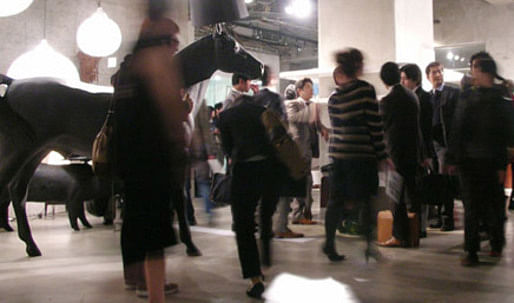
Based on last year’s numbers, more than 100,000 people were projected to attend the three-day 100% Design Tokyo event, a big part of Tokyo Designers Week 2008, which concluded last week. It’s the largest, curated, trade show exhibition one could ever imagine—hundreds of international exhibitors both established and emerging showed furniture, interiors, products and concepts to an audience of design professionals, students and visitors. Countless thousands of cups of (green) tea were consumed, Subway sandwiches got the prime snack selling position inside the venue and millions of digital photos were snapped as visitors scurried through the massive show in the enormous, temporary, white tent pavilions at Meiji Jingo Gaien park. The fourth annual 100% Design Tokyo, inspired by the success of London’s 100% Design, included a dozen show within shows on the site: 100% Light, 100% from Zero, 100% Prototype among others.
By Terri Peters
The main entry, 100% Design Tokyo.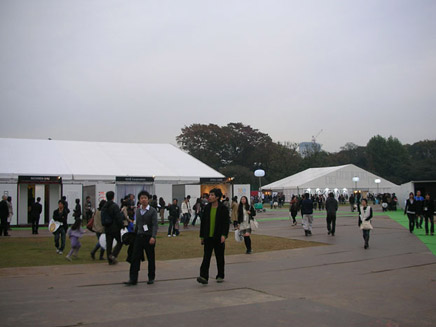
100% Design, outside the main show near the Container Ground exhibition 'village'.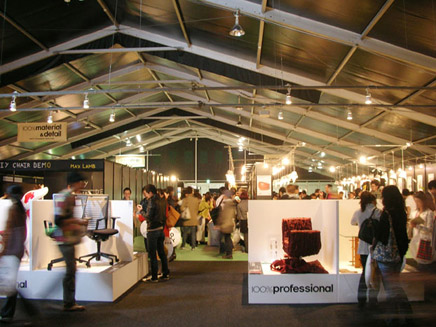
100% Design, inside the show at 100% Professional.
And 100% Tokyo is just a part of the 23rd annual Tokyo Designers Week—another massive and well-curated show held during this time is Design Tide Tokyo and Design Tide Mart, at Tokyo Midtown. Design Tide featured innovative design from around the world: furniture and lighting from DMY Berlin, digitally manufactured vases and sculptures from Japanese designers Central Line studio and striking linear lighting installations by Tomas Alonso and sculptures by Chris Kirby. With so many designers in town for the Design Week, Tokyo’s galleries, bars, cafes and exhibition spaces were positively heaving with pop-up exhibitions, product launches, parties, art openings and fashion shows around the city.
Design Tide Opening Party, image courtesy Design Tide.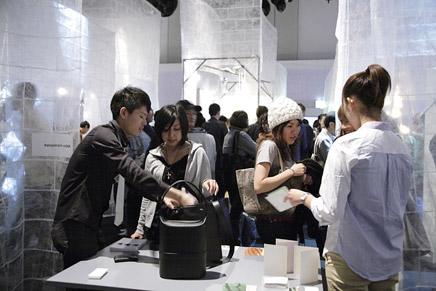
Design Tide Opening Party, image courtesy Design Tide.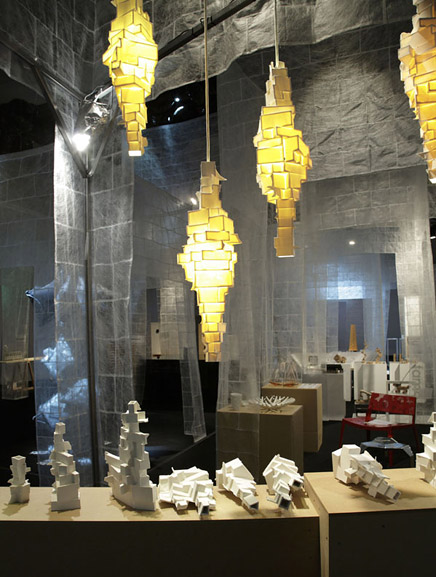
Tokyo based Canadian designer Chris Kirby exhibited his new ‘Negative Series’ lights at Design Tide, an independent design event that happened alongside Tokyo Designers Week. Image courtesy Design Tide.
One small but significant part of 100% Design was 100% Futures, a show of student works that has historically been an important part of Tokyo Design Week. This is the first year that the student work has been included at the main venue of 100% Design and the students made sure 100% Futures rose to the challenge of participating along side grown up work. While end of year or graduate design student shows are nothing new, 100% Futures turned the concept on its head in scale and scope. More than 50 schools in Japan exhibiting the best student work and selective curating focused their energy on creating a coherent exhibition. Students of industrial design, interior design, architecture, graphic design, and spatial design were focused around the concepts of eat, move, comfort, protect and touch.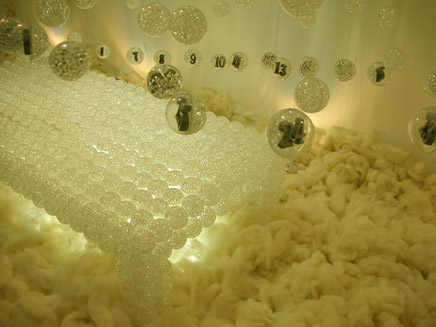
100% Futures, Students from University of Tsukaba installed an all white soothing environment focused on 'healing' with new furniture designs.
Despite a few lost-in-translation conversations and texts, (the exhibition was entirely in Japanese) highlights seemed to be in innovative furniture and lighting design. Interior architecture students from ICS College of Arts showed diverse works with the theme of creating “an ideal living environment”. Prototype furniture included a laser cut chair with slots for tidying up clothing and a heavy carved wooden stool sloped and sculpted to be extra comfortable. The installation by students of interior architectural design at university of Tsukuba drew crowds with its mystifying glowing white table and hanging sculptures. Interior design students at Mukogawa Women’s University showed various designs for tactile furniture, wall coverings and interior products with the theme ‘touch’. Another interesting project was ‘Inochi no ki’ a recycled lamp made from found kitchenware, including forks and wine glasses.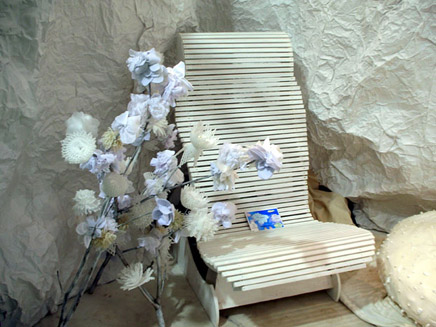
100% Futures Students from Mukogawa Women's College investigated the idea of 'touch' with tactile new furniture and interiors designs.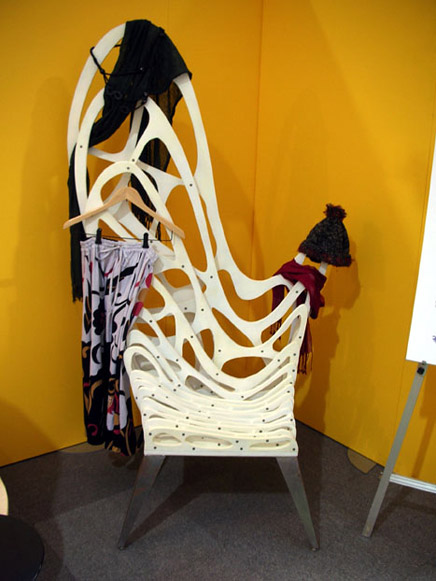
100% Futures Students from ICS College of Arts presented prototype furniture and interiors projects.
A unique aspect of 100% Futures show was that half the exhibition was of themed student work and half was structured around a semester long collaboration project with industrial sponsors, some of the biggest companies in Japan: Toto, Able, Nissan, Morimoto, Fujitsu and Fuji.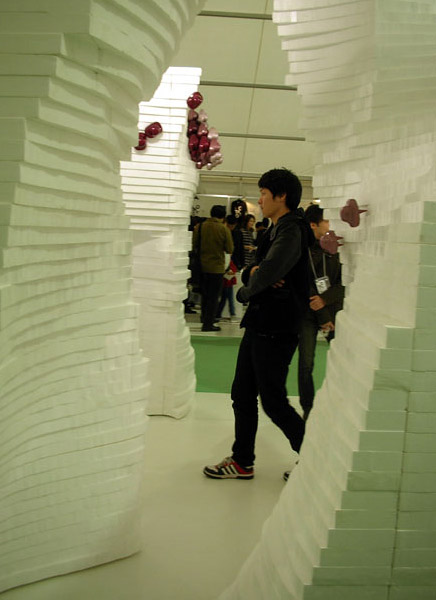
100% Futures, Led by professional designer and tutor Hiroshi Yoneya, students from six different universities worked in collaboration with Nissan to produce new works on the theme of 'motion'. "We are embodying the pivotal dimension 'movement' in an abstract world". The teams worked together between May and October designing and researching this installation.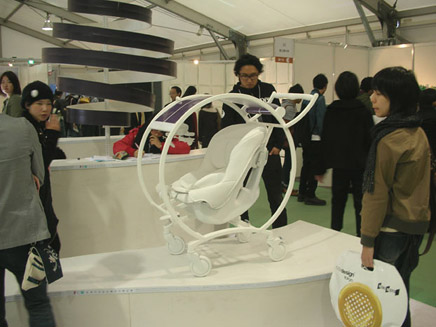
100% Futures, Let by Tomoyuki Tanaka, the collaboration between students from seven different Japanease design schools and Fuji Electric Systems was concerned with the creation of eco friendly ways of living using ne w solar batteries. "We thought forms for new technology and designed three products: 'eco-cart', 'community tree' and 'neo-mushi' by three ways of thinking: extension, alternative and innovative."
A crash course in networking, professionalism, communication and business, the Futures students were exposed not only to the daunting challenge of preparing an installation to be potentially viewed by about 100,000 paying visitors who are expecting professional quality work, but also critical skills in confidence and communication. Skills like this are almost entirely untaught in architecture school—it’s truly valuable experience for the students to stand next to their work and greet professional and lay visitors and explaining their approach to their work.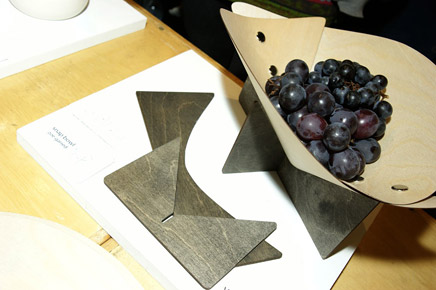
Zoe Garred's Snap Bowl shown at Design Boom Mart is made from four flat pieces of aircraft plywood (very strong, thin and flexible wood). Two pieces bend and snap together to make a bowl and two pieces slot together to make a base. The bowl can be taken apart and stored flat again when not in use. Image courtesy Zoe Garred.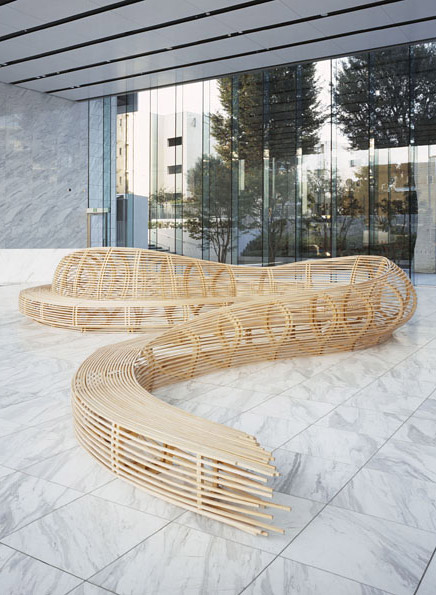
Visitors came to see Frank Gehry's Tokyo Bench outside the World Company Building in Tokyo, an extension site of Design Tide Tokyo. Image courtesy Design Tide.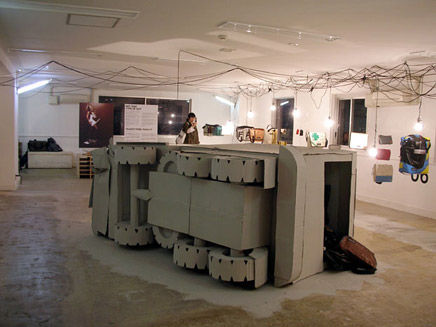
At Claska Hotel, Keep on Truckin' is an exhibition of recycled truck tarp Freitag bags celebrating 15 years of this durable Swiss-made product.
Of course it wasn’t all networking and no play—many of the best parties as part of Tokyo Designers Week were free—just very, very, crowded. Surely the best networking happened here, as design lovers mingled at after parties and launches around the city, from the Cibone party at Aoyama Bell Commons where guests included Mooi’s giant horse sculpture, to the Mother of All Design Party at Marunouchi house where guests huddled around designer Nosigner’s stunning broken eggshell sculptures, to late night DJ sessions at Claska Hotel with its rooftop campsite drawing crowds for moon watching.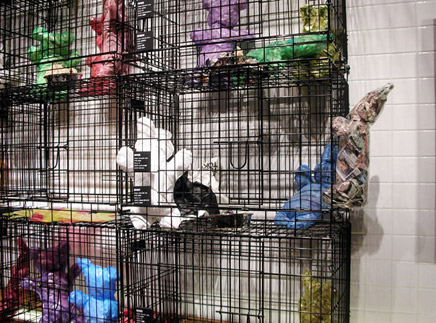
Japanese designers Tomohiro Kato and Satoshi Hasegawa exhibited their Popet dolls at 'The Mother of All Design' party at Marunouchi House. The dolls are conceptually designed rubbish bags that turn into a cute pet. "Popet is a pet that feeds on trash. If you do not separate rubbish according to the type or throw away what you do not have to, he or she will go down with a stomach ache."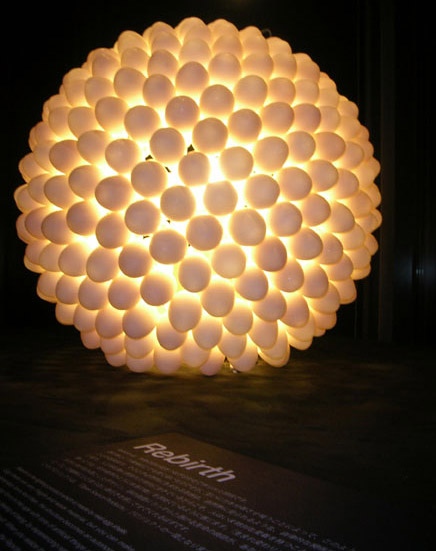
'Rebirth' is an new light by Japanese designer Nosigner made of real eggshells carefully assembled. His work was on show at the launch party 'The Mother of all Design' held at Marunouchi House.
Terri Peters is an architect and design journalist who has just relocated from London to Copenhagen, Denmark.
I'm an Assistant Professor at Ryerson in Toronto. Originally from Canada, after studying at Dalhousie, I spent 8 years in London, UK studying and working as an architect and writer. I then moved to Denmark to study for my PhD in architecture 2008-2014. You can read some of my ...
1 Comment
I'm really curious whos are the students from University of Tsukaba installed the all white soothing environment. Great job. I'm looking for co-partner, artist to create garbage dump installation to my photo exhibition in Japan and US.
Any info is greatly appreciated.
J
Block this user
Are you sure you want to block this user and hide all related comments throughout the site?
Archinect
This is your first comment on Archinect. Your comment will be visible once approved.